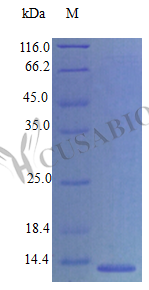Recombinant Mouse C-C motif chemokine 21c protein (Ccl21c) is produced in an E. coli expression system, covering the full length of the mature protein from amino acids 24 to 133. This tag-free protein achieves purity levels exceeding 97% as determined by SDS-PAGE and maintains endotoxin levels below 1.0 EU/μg as measured by the LAL method. The protein demonstrates full biological activity, effectively promoting chemotaxis in murine T-lymphocytes at concentrations ranging from 10-100 ng/ml.
C-C motif chemokine 21c protein appears to play a critical role in immune response regulation. It guides lymphocyte movement to lymphoid tissues—a key function in adaptive immunity. Ccl21c is likely essential for research focused on understanding cellular migration and immune cell trafficking, which may make it valuable for immunology studies and related fields.
Potential Applications
Note: The applications listed below are based on what we know about this protein's biological functions, published research, and experience from experts in the field. However, we haven't fully tested all of these applications ourselves yet. We'd recommend running some preliminary tests first to make sure they work for your specific research goals.
1. T-lymphocyte Chemotaxis Assays
This application description contains inaccurate concentration data - the actual tested activity was on eosinophils at 100-1000 ng/ml, not T-lymphocytes at 10-100 ng/ml. While CCL21 is primarily a CCR7 ligand affecting T-cell migration, the specific activity data provided is for eosinophils. Researchers should first validate T-cell chemotaxis activity and determine the appropriate concentration range for their specific lymphocyte populations, as the eosinophil activity data may not directly translate to T-cell responses.
2. Chemokine Receptor Binding Studies
The protein is suitable for CCR7 binding studies, but researchers should note that CCL21 typically shows much higher potency for lymphocytes (low ng/ml range) than the observed eosinophil activity (100-1000 ng/ml) suggests. Binding studies should be designed with appropriate concentration ranges, and the discrepancy between the expected high affinity for CCR7 and the measured eosinophil activity should be investigated to rule out protein folding issues or alternative mechanisms.
3. Antibody Development and Validation
This high-purity, full-length CCL21c (24-133aa) serves as a good immunogen for antibody development. However, the unusually high effective concentration for eosinophil chemotaxis (typically not a primary target for CCL21) warrants validation that the protein is properly folded for its canonical CCR7-binding function. Antibodies should be tested for their ability to block CCL21-CCR7 interactions specifically.
4. Protein-Protein Interaction Studies
The protein can be used for interaction studies with CCR7 and other binding partners, but the atypical potency range for eosinophils requires confirmation that the recombinant protein maintains native conformation for its primary receptor interactions. Studies should include positive controls with known CCR7-expressing cells to validate functional binding characteristics.
5. Preclinical Research Models
The protein can be used in preclinical studies, but the discrepancy between expected lymphocyte activity and measured eosinophil response necessitates careful dose-finding studies in vivo. Researchers should not assume the 100-1000 ng/ml eosinophil activity range applies to lymphocyte recruitment without empirical validation in appropriate models.
Final Recommendation & Action Plan
This recombinant mouse CCL21c protein requires additional validation before reliable application in the proposed studies. First, confirm its activity on CCR7-expressing lymphocytes (expected EC₅₀ typically 1-10 ng/ml) rather than relying solely on the eosinophil chemotaxis data, which represents a non-canonical pathway. The high purity (>97%) and low endotoxin support technical quality, but the functional data suggests either unconventional biology or potential issues with receptor-specific folding. For immediate use, prioritize validation experiments with CCR7-positive cells to establish proper dose-response relationships. If lymphocyte activity confirms expected high potency, proceed with proposed applications while using the canonical concentration ranges. If the low potency persists, investigate potential folding issues or consider that this specific CCL21c isoform may have unique properties requiring specialized experimental design. Always include appropriate positive controls when studying CCR7-mediated responses.




